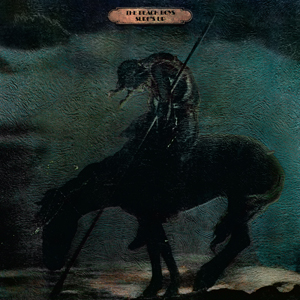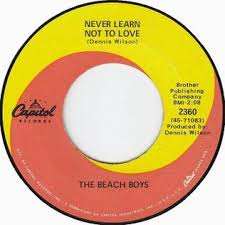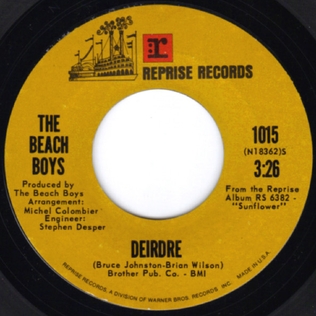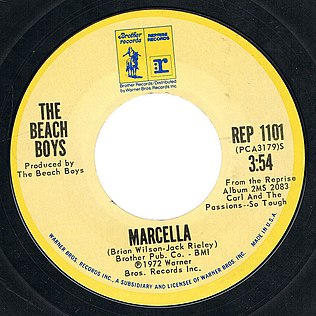
Sunflower is the 16th studio album by the American rock band the Beach Boys, released on August 31, 1970 by Reprise Records, their first for the label. It received favorable reviews, but sold poorly, reaching number 151 on the US record charts during a four-week stay and becoming the lowest-charting Beach Boys album to that point. "Add Some Music to Your Day" was the only single that charted in the US, peaking at number 64. In the UK, the album peaked at number 29.

20/20 is the 15th studio album by the American rock band the Beach Boys, released February 10, 1969 on Capitol Records. The LP was named for being their 20th overall release when factoring in live albums and compilations. Much of 20/20 consists of outtakes from earlier albums. It reached number 3 on UK record charts and number 68 in the U.S. Brian Wilson was absent during most of the album's recording after admitting himself into a psychiatric hospital, requiring brothers Carl and Dennis to retrieve several outtakes he had recorded years earlier. While Brian does not appear on the front cover, the inner gatefold of the original vinyl release features him alone, behind an eye examination chart.

Surf's Up is the 17th studio album by American rock band the Beach Boys, released on August 30, 1971 on Brother/Reprise. It received largely favorable reviews and reached number 29 on the U.S. record charts, becoming their highest-charting LP of new music in the U.S. since 1967. In the UK, Surf's Up peaked at number 15, continuing a string of top 40 records that had not abated since 1965.

Carl and the Passions – "So Tough" is the 18th studio album by American rock band the Beach Boys, released May 15, 1972 on Brother/Reprise. The album is a significant musical departure for the band and is the first to feature the Flames' Blondie Chaplin and Ricky Fataar as additions to their official line-up. It sold poorly and was met with lukewarm reviews, but later gained stature as a cult favorite among fans.

"Never Learn Not to Love" is a song recorded by the American rock band the Beach Boys that was issued as the B-side to their "Bluebirds over the Mountain" single on December 2, 1968. Credited to Dennis Wilson, the song is an altered version of "Cease to Exist", written by the Manson Family cult leader Charles Manson. The blues-inspired song was written specifically for the Beach Boys, with Manson's lyrics addressing personal tensions that he had witnessed between Dennis and his brothers Brian and Carl.

"Please Let Me Wonder" is a song by the American rock band the Beach Boys from their 1965 album The Beach Boys Today!. Written by Brian Wilson and Mike Love, it was the first song Wilson wrote under the influence of marijuana. The lyrics are about a man who does not know if a girl loves him and is afraid of learning the answer, and so he prefers to fantasize that she does. On February 15, the song was issued as the B-side to their "Do You Wanna Dance?" single before the album's release.

"Do It Again" is a song by the American rock band the Beach Boys that was released as a standalone single on July 8, 1968. It was written by Brian Wilson and Mike Love as a self-conscious callback to the group's earlier surf image, which they had not embraced since 1964. Love and Wilson also share the lead vocal on the song.

"Surf's Up" is a song recorded by the American rock band the Beach Boys that was written by Brian Wilson and Van Dyke Parks. It was originally intended for Smile, an unfinished Beach Boys album that was scrapped in 1967. The song was later completed by Brian and Carl Wilson as the closing track of the band's 1971 album Surf's Up.

"Disney Girls (1957)" is a song by American rock band the Beach Boys from their 1971 album Surf's Up. It was written and sung by Bruce Johnston, who also plays upright piano, Moog synthesizer, and mandolin. Johnston later rerecorded the song for his 1977 solo album, Going Public.

"Cool, Cool Water" is a song by the American rock band the Beach Boys from their 1970 album Sunflower. It was written by Brian Wilson and Mike Love and later issued as an A-sided single in March 1971.

"Add Some Music to Your Day" is a song by American rock band the Beach Boys that was released in the US on February 23, 1970 as the lead single from their album Sunflower. It was written by Brian Wilson, Joe Knott, and Mike Love. Wilson later said that Knott "was a friend of mine who wasn't a songwriter but he contributed a couple of lines. But I can't remember which ones!"

"Deirdre" is a song by the American rock band the Beach Boys from their 1970 album Sunflower. Written primarily by Bruce Johnston, it is a love song named after the sister of one of his ex-girlfriends, and is one of his two song contributions on the album, the other being "Tears in the Morning". Johnston has claimed that co-writer Brian Wilson's contributions were limited to a few lyrics, although music historians Andrew G. Doe and John Tobler wrote in 2004 that "Deirdre" had been "developed from a musical theme first used in 'We're Together Again,'" a 1968 composition credited to Brian Wilson and singer Ron Wilson.

"Don't Go Near the Water" is a song by American rock band the Beach Boys from their 1971 album Surf's Up. Written by Mike Love and Al Jardine, the song puts an ironic, ecological spin on the traditional Beach Boys beach- and surf- based songs: instead of enjoying surfing and other fun activities, this time the listener is advised to avoid the water for environmental reasons.
"A Day in the Life of a Tree" is a song by American rock band the Beach Boys from their 1971 album Surf's Up. It was written by Brian Wilson and the group's manager Jack Rieley, who also performed lead vocal. The lyrics were inspired by Wilson's feelings toward environmental pollution.

"It's About Time" is a song by American rock band the Beach Boys from their 1970 album Sunflower. Written by Dennis Wilson, Al Jardine, Bob Burchman and Carl Wilson, it was issued as the B-side of the "Tears in the Morning" single. Jardine said, "'It's About Time' was Carl, Dennis and I. That's a good one. I like that production. That was mostly Dennis, and I just helped with the lyrics. Dennis and Carl did the track."
"Tears in the Morning" is a song by the American rock band the Beach Boys from their 1970 album Sunflower. Written by Bruce Johnston, it was issued as a single, with the B-side "It's About Time". The single failed to chart in the U.S., but reached the top 5 in the Netherlands.

"Marcella" is a song by the American rock band the Beach Boys from their 1972 album Carl and the Passions – "So Tough". Written by Brian Wilson, Jack Rieley, and Tandyn Almer, the lyrics were inspired by Wilson's fixation with a local massage therapist. It is the last song to feature Bruce Johnston during his original tenure in the band.
"Student Demonstration Time" is a song by the American rock band the Beach Boys from their 1971 album Surf's Up. It is an altered version of Jerry Leiber and Mike Stoller's "Riot in Cell Block Number 9" with new lyrics by Mike Love.
"Loop de Loop (Flip Flop Flyin' in an Aeroplane)" is a song by the American rock band the Beach Boys that was written by Al Jardine, Brian Wilson, and Carl Wilson. It was originally recorded between the late 1960s and 1970s. In 1998, Jardine finished the song for its release on Endless Harmony Soundtrack.
"Love to Say Dada" is an unfinished song that was written by American musician Brian Wilson for the Beach Boys' Smile project. It referenced the drug LSD in its initials and was one of the last tracks recorded for the album. The song subsequently evolved into "Cool, Cool Water" from Sunflower (1970).















